Alabama Doctor Tells of ‘Terrifying’ Reality for Pregnant Women With COVID

As a maternal-fetal medicine specialist at the UAB Hospital, Dr. Akila Subramaniam sees some of the most complicated pregnancies in Alabama and parts of the surrounding four states. She has never seen anything like this.
The 1,157-bed hospital has already admitted 39 pregnant women with COVID-19 so far this month. Ten of those are in the intensive care unit, and seven are on ventilators due to the disease. In a usual week, Subramaniam told The Daily Beast, the number of pregnant women in the ICU would be one or two.
As of this week, there were no more available ICU beds in Alabama for any patients, pregnant or not. The state health department has asked the federal government for staff and other resources, and Gov. Kay Ivey has reinstated a state of emergency. Still, more than half of the state’s population remains unvaccinated.
MAGA Rep Who Boasted About Defying Pelosi’s Mask Rule Gets COVID—but Still Won’t Mask Up
Dr. Subramaniam told The Daily Beast about what it’s like to care for pregnant patients under these conditions. Her interview has been edited and condensed for clarity.
“As physicians, we talk about who’s a white cloud and who’s a black cloud—meaning some people tend to have worse luck in terms of how things roll, and some people never seem to have any complicated patients on their service. I tend to be more on the darker side of things, for whatever reason. And I’ve never had this many [patients] in the ICU at one time.”
“We didn’t really have huge surges back in the summer of 2020—not like other people saw over the winter of 2020, early 2021. We would have an occasional patient in the unit, maybe one, maybe two, but we never saw this number… That sort of shifted in this new wave, which is mostly attributed to the Delta variant. If you look at what [we saw in] March to June, it was a manageable level of things. And then starting in the end of July is when we started to see an uptick in cases and how much severe disease we’re seeing.”
“Our rates of people doing okay and surviving are really pretty good, considering our numbers and the resources and all of those things. But it’s not good enough, because we don’t have any ICU beds. I was just hearing today that they kept trying to get someone flown in here from the [Florida] panhandle. They couldn’t get her here and she died, because there’s no bed to bring her to. That wouldn’t happen in a normal given state.”
“It’s a little bit more challenging where we have to deal with ultimately two patients as opposed to one, and what we do for one can harm the other… The majority of patients want everything to be done for the baby, but that’s really hard when you know that some of those things done for the baby are really putting mom’s life at risk.”
“It’s really hard to talk to a patient who’s on high flow, nasal cannula, struggling to breathe and ask them, ‘Well, what do you want us to do when they put this tube down your throat? Do you want us to do a C-section to potentially save your baby? That may end up harming you, you might die…Do we focus on you? Do we focus on the baby?’”
“Oftentimes these women are intubated. So we’re getting consent either before they have had the tube put in their throat, or from a partner, or we’re doing it emergently with two physicians. I can’t imagine how scary it must be to all of a sudden wake up and know that you had a baby and you had no understanding of what that was like. It sounds terrifying, but that’s what is happening.”
“Even for those of us who are used to seeing maybe 30 patients in a day, and now seeing 30 plus 10 in the ICU, it’s a challenge. It’s mentally taxing, it’s physically taxing. When you see 40 patients in a day, you’re not giving each patient the same time as if you were seeing 30 or 20. You’re just not. Women continue to labor, women continue to have deliveries and all of that continues to happen. We really do face resource shortages, and we’re doing fine and we’re making it, but there is a breaking point.”
“If you were to talk about how pregnant women are doing, we need to talk about vaccinated pregnant women, and then we need to talk about unvaccinated pregnant women differently… What we’re seeing, at least in our [patients] that are in our ICU and in the [patients] that are in our labor floors needing additional oxygen, is they are unvaccinated. We don’t have a single patient [in the ICU] who has completed the vaccination series.”
“All I can say is get vaccinated… I’m not saying you can’t get COVID, I’m not saying you can’t give your friends COVID, but hopefully it will keep you out of an ICU.”
Get our top stories in your inbox every day. Sign up now!
Daily Beast Membership: Beast Inside goes deeper on the stories that matter to you. Learn more.

